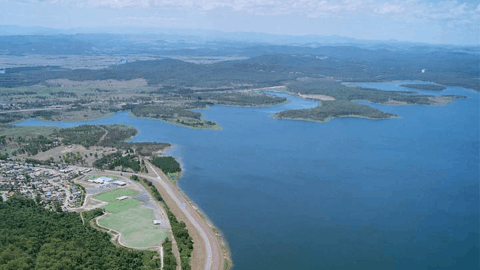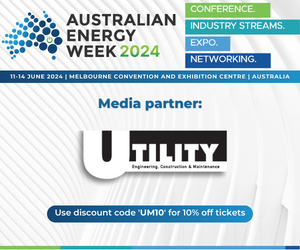WaterGroup’s Head of Sales and Marketing, Aimi Macready, and Head of Smart Metering Operations, Holly Guy, talked about water data and its flow-on effect, implementing sensors and IoT devices for a better water future and the inclusion of women in the water industry.
“Well, we wouldn’t be here today if it wasn’t for one of the founders of WaterGroup, our Managing Director, Guenter Hauber-Davidson. He has been instrumental in shifting focus around water efficiency and Internet of Things (IoT) devices across the industry and continues to support the importance of diversity and inclusion of women in the water industry,” Ms Macready said.
“Less than one in five water workers are women, according to new research by the World Bank’s Water Global Practice. At WaterGroup, with over a third of our staff being female and two in leadership roles I am proud to be working at WaterGroup.”
Ms Macready has been involved in technology for over 18 years. She is passionate about getting to the heart of individual business needs. She has over 25 years of experience working across world-class technology and related organisations.
Ms Macready is strongly determined to solve ongoing business challenges with the help of IoT-based solutions, saying that “the water industry has advanced tremendously in terms of technology”.
Ms Guy came into the water industry and smart metering field more recently.
“I wanted to work for a company that was actively investing in ways to revolutionise how we manage global resources,” Ms Guy said.
“I was lucky to come across a sales role at WaterGroup back in 2019.”
Ms Guy has been with WaterGroup ever since and now heads up the smart metering operations team. She has moved quickly to develop a lot of knowledge and is dedicated in realising the benefits of the latest IoT and LPWAN technologies for WaterGroup’s customers. Her career path within WaterGroup has fed her desire to optimise water resource usage while enhancing environmental conservation.
Advantageous IoT

When reflecting on her career, Ms Macready said that she stumbled into the Internet of Things (IoT) industry. Her first role in a technology integration and consulting business had just started to talk about IoT in the early to mid-2000s.
“I became more interested in IoT when I moved into the connected lighting industry — it was a light bulb moment,” Ms Macready said.
“The intake and evolution of IoT has and continues to impact customers and businesses across lighting and water. Commercial, industrial, retail, and tertiary segments are, in my experience, the ones that have been benefiting the longest. Our case studies and results for these clients are hard proof that technology and the data it provides, if acted upon appropriately, have a big impact on how a business runs and becomes more sustainable.”
Ms Guy believes that the smart water industry has changed significantly with the introduction of IoT technology.
“It has strongly accelerated. It has led to more advanced sensors and data analytic capabilities. In smart water monitoring, IoT has outpaced 3G or other radio networks due to energy efficiency, scalability, interoperability, and diversity in connectivity options.”
Making the most of your data and its flow on effect
“Smart systems generate a lot of data,” Ms Guy said.
“Businesses that adopt smart monitoring need to address how they will effectively manage the data coming in – and act upon it. WaterGroup places a lot of importance on ensuring our clients can interpret and use the data efficiently. As a company, we want our clients to instantly have access to the information they need without drowning in data, pardon the pun.”
Ms Macready said that if you manage and interpret data and drive the corresponding appropriate action to its full potential, you can create a significant ‘flow on effect’.
“It can improve efficiency within your business, enhance your sustainability and ESG outcomes, and improve your overall water consumption.”
Recently, IoT data helped a supermarket client of WaterGroup to discover that their staff were defrosting produce with running taps instead of thawing it in the cool room. Adherence to best practice procedures was addressed to maintain optimum product quality by going back to correct defrosting techniques.
Macready said this same supermarket also used smart water metering data as a foundation for a business case for stores struggling with refrigeration and air conditioning systems. Data-driven decisions helped prevent damage and lead to better systems to cool their stores on hot days.
“Reducing a customer’s carbon footprint through water savings is also an attractive benefit for businesses that want to reach their 2025 sustainability goals. Fun fact: A leaking toilet continuously flowing for a year can create a carbon footprint equivalent to the annual emissions of a small passenger car.”
Water savings and software
Ms Macready has said that she believes that now there are more basic water savings and water efficiency measures in place, the industry will continue to move towards a high-tech level of monitoring. With all the software, monitoring and IoT devices, the industry can understand what is happening, keep efficiencies high and avoid wastage wherever possible.
“The advantages are real-time monitoring, predictive maintenance, and seamless integration with existing infrastructure,” Ms Guy said.
“We’ve seen an evolution in how we collect, analyse, and use the data we collect from meters. WaterGroup is continuously gaining insights into the water systems and networks we monitor, making us more efficient in maintaining those networks. One of the biggest advantages is improved resource management and customer satisfaction. We’re a society that thrives on having data at our fingertips. Software advancements are making it readily available allowing us to action issues as they arise or even ahead of time.”
Ms Guy’s involvement in the industry has seen the impact of software improve the quality of data received.
“I reckon software developments have ensured the data we’re receiving from smart meters is more user-friendly whilst being easily interoperable with other business technologies.
“We’re part of the evolution of smart cities, so integration with multiple systems is necessary for success. WaterGroup’s SaaS platform, UtiliOS, is one of the ways we ensure our clients have access to best of breed software. UtiliOS offers the capability of integrating with other software whilst providing a device-agnostic platform allowing you to display all your smart monitoring data in one place.”
Technology supports savings.
With the wide range of IoT devices available in the market, WaterGroup needs to understand many aspects of the systems in which they work. There are differences between the biggest and smallest installations.
“If we’re just dealing with a few points, we want devices that can connect through narrowband IoT (NB IoT),” Ms Guy said.
“Those devices, like our mobile phones, can connect to the existing telecommunications network. On the other hand, if we’re doing a mass rollout of hundreds or thousands of devices, we might look at long-range, wide-area networks (LoRaWANs). A dedicated network can look after many devices while keeping operational costs down.”
Using IoT devices, WaterGroup is trying to pick up when, where, and how abnormal usage occurs. The data collected from a smart monitoring system can pick up unusual patterns and with the use of artificial intelligence (AI) and machine learning it can identify or even predict where a leak might occur.
“Every leak has a pattern and a fingerprint,” Ms Guy said.
“We have spent enough time on those sites to know what is normal and abnormal. As a result, we can get close to the cause of a leak and its location, saving money for our clients.”
The future for WaterGroup
Ms Guy said that she wants to see every eligible and particularly larger commercial/industrial water meter monitored.
“By doing so, we can help prevent undetected water leaks for businesses throughout Australia and our water networks and limit the devastating effects water shortages can have on our communities.
“We know when more water is used than necessary and AI can help streamline the procedures to ensure people know what to do.
“As a company, we are working hard to automate previously manual procedures to ensure that we can take action faster and minimise, if not mitigate, the risks associated with water loss.”
WaterGroup has been around since 2006 and is a company known for its ability to address many of the water industry’s challenges. Ms Macready pointed out how WaterGroup was the first to bring Australian utilities a commercially ready NB-IoT, fully integrated, ultrasonic smart water meter, an industry favourite now.
“We’re an effective team regarding communication, transparency and collaboration,” Ms Guy said.
“This is not just about communication between our clients but our providers too. I think that is what makes us one of the strongest companies in providing fully integrated end-to-end solutions. By embracing change, being adaptable and fostering a culture of innovation, we’re confident in our ability to positively impact water management in the future.”
In order to look forward, Ms Macready is looking back. Based on what WaterGroup has achieved in the past, she says that the company will continue to evolve and make an impact.
“With a progressive view of the industry and utilising the latest in IoT and LPWAN technologies, WaterGroup has won awards for excellence in this area.
“We see water network monitoring with technologies like our SmartEAR online leak detection sensor as the next frontier.”
This sponsored editorial is brought to you by WaterGroup. For more information, visit www.watergroup.com.au.















